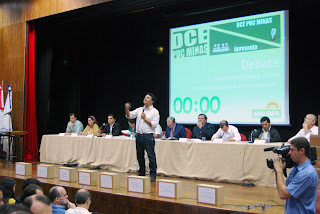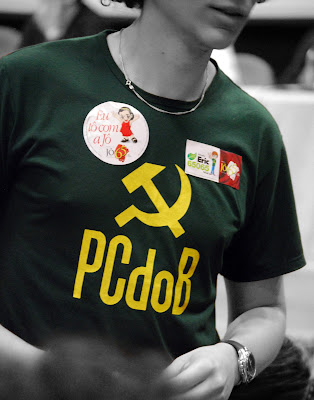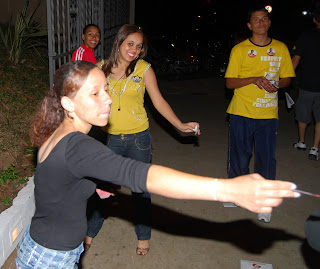Is it really any wonder there’s no adherence to fire codes in Brazil?
 Ricardo and I found seats near the front right of the auditorium. For a half-hour we watched photographers and TV cameramen get in position to immortalize the Belo Horizonte mayoral debate that was about to take place. As the seats filled up, foot soldiers (“militantes”) pushed pamphlets and platforms of their respective candidate from the 8 parties represented in the debate. By 7:29 we had collected a dozen new brightly colored leaflets to add to our collection in the drawer below our TV that had been growing steadily in the last few weeks as the campaigns for the October 5th vote started to pick up speed.
Ricardo and I found seats near the front right of the auditorium. For a half-hour we watched photographers and TV cameramen get in position to immortalize the Belo Horizonte mayoral debate that was about to take place. As the seats filled up, foot soldiers (“militantes”) pushed pamphlets and platforms of their respective candidate from the 8 parties represented in the debate. By 7:29 we had collected a dozen new brightly colored leaflets to add to our collection in the drawer below our TV that had been growing steadily in the last few weeks as the campaigns for the October 5th vote started to pick up speed.And then, in the name of progress, order was called for by PUC’s student body president. He and a gray-haired local journalist—who a generation ago was likely taking part in a different kind of manifestation of political culture in a different kind of political climate—laid down the rules they would follow to moderate the debate. Each of the 8 candidates would have 2 minutes to introduce him or herself and his or her campaign. Next, 2 journalists from local newspapers would ask a question for 4 of the candidates to answer in 2 minutes each. In part three, volunteers would draw the names of 2 students from a box placed in front of each candidate, and these lucky 16 would ask a question of their chosen candidate, who would, again, have 2 minutes to answer each question. The debate would then wrap up with a (wait for it…) 2-minute closing statement from each candidate.

While it was at first a shock, after 6+ months living with virtually no reverence for time, to see the giant timer projected behind the stage counting down each 2-minute segment, I was glad to see it. If it weren’t there, the longwinded-squared nature of these 8 being both Brazilian and politicians would have taken the debate into the next morning.
The 8 candidates represented the following parties:
PDT: Partido Democrático Trabalhista, Democratic Labor Party
PCO: Partido da Causa Operária, Workers’ Cause Party
PMDB: Partido do Movimento Democrático Brasileiro, Brazilian Democratic Movement Party
PRTB: Partido Renovador Trabalhista Brasileiro, Brazilian Labor Renewal Party
PSB: Partido Socialista Brasileiro, Brazilian Socialist Party
PCdoB: Partido Comunista do Brasil, Communist Party of Brazil
PSTU: Partido Socialista dos Trabalhadores Unificado, Unified Socialist Workers’ Party
DEM: Democratas, Democrats
According to the greatest of all references, Wikipedia (see article), there are 27 "official" political parties in Brazil. Of these 27, Wikipedia classifies 6 as “major”: PDT, PMDB, DEM, along with PT (Partido dos Trabalhadores, Labor Party), PSDB (Partido Social Democrático Brasileiro, Brazilian Social Democratic Party), and PP (Partido Progressivo, Progressive Party). (PT, PMDB, and PSDB are the juggernaut parties nationally, with PP, DEM, and PDT a tier behind and more influential at the state level). Left to right on the political spectrum, these 6 go like this:
PDT – PT – PMDB – PSDB – DEM – PP
Of Wikipedia’s 6 “medium level” parties (which I won’t bother listing), the PCdoB and PSB supported candidates for the debate, while the PCO, PRTB, PCB, and PSTU represented the 15 “minor parties” in Brazilian politics at the debate.

I should note how municipal campaigns work down here.
First, there are the mayoral candidates themselves, affiliated with a particular party.
Piece of cake.
Beneath them are candidates for a given number of seats as vereadores, something along the lines of city councilors, who, if elected, will be in charge of drafting policies for a particular area of government (i.e. health, education, transportation, etc.). Each candidate for vereador affiliates him or herself with a particular party. All vereador candidates in one party share party resources for publicity (TV ads, cartels, leaflets, bumper-stickers, etc.), yet all compete against each other as well as against candidates from other parties.
Some parties, usually small ones having no candidate for mayor themselves, will form alliances among themselves and with larger parties supporting a candidate. In such a symbiotic alliance, the larger party’s mayoral candidate will ideally gain the votes of the rank-and-file of smaller parties, and the candidates for vereador from small parties will have a more “name brand” candidate to latch onto in their quest for a piece of power.

I should probably take a step back and answer the obvious question: why all the parties?
At the municipal level, and when voting for Brazil’s equivalent of congressmen and women at the national stage, Brazil’s electoral system is proportional. Extremely so. In 2006, for instance, winning 0.3% of the vote got some parties at least 1 seat in Brazil’s equivalent of the House of Representatives. Thus, there’s plenty of incentive for small parties to get out there and try their hand at government. At the gubernatorial and presidential levels, a candidate wins by an absolute majority, giving the country’s major parties an edge (like in France, a run-off is held between the top two first-round finishers if there is no absolute victor). Current President Luis Inácio Lula da Silva (“Lula” for short) is from PT.
What are the consequences of Brazil’s hyper-proportional system that makes even Israeli politics look exclusivist?
 First, obviously, there’s division, most especially on the left. Historically, this is nothing new; divergence in the leftist camp starts at the roots, with discrepancies among Lenin, Trotsky, Tito, Stalin, and Mao and their interpretations of Marxist thought, not to mention the differences between all those who have tried to follow in these giants' footsteps. Alliances must thus be made to avert the complete fracturing of the Brazilian left, though these alliances aren’t guaranteed to last from one election to another and will change with the variable winds of politics. Alliances also must be formed in Congress to assure that bills get passed by simple majority. In such a climate of mutual back-scratching, gridlock and spectral antagonism tend to be less prevalent than strictly two-party systems such as our own. A definite plus in my book. On the negative side, an interesting analysis would be to see whether within these multiple points of political bargaining exists the roots of Brazil's rampant culture of political corruption.
First, obviously, there’s division, most especially on the left. Historically, this is nothing new; divergence in the leftist camp starts at the roots, with discrepancies among Lenin, Trotsky, Tito, Stalin, and Mao and their interpretations of Marxist thought, not to mention the differences between all those who have tried to follow in these giants' footsteps. Alliances must thus be made to avert the complete fracturing of the Brazilian left, though these alliances aren’t guaranteed to last from one election to another and will change with the variable winds of politics. Alliances also must be formed in Congress to assure that bills get passed by simple majority. In such a climate of mutual back-scratching, gridlock and spectral antagonism tend to be less prevalent than strictly two-party systems such as our own. A definite plus in my book. On the negative side, an interesting analysis would be to see whether within these multiple points of political bargaining exists the roots of Brazil's rampant culture of political corruption.Another plus for Brazil's proportional system: direct participation in politics becomes more active, with more people fighting for the votes of an ever more pluralist electorate. One could maybe argue that a proportional electoral system leads to an increase in voter participation, as there exists a greater probability that a given party’s platform will match a voter’s beliefs, giving her greater incentive to vote. In Brazil, however, that argument is a moot point, as voting is compulsory.
In sum, Brazil’s electoral system is a far cry from our own, where two giant heavyweights duke it out at every level of politics for a majority of votes. Personally, while I wouldn’t favor a system in which I’d have to argue why the American Democratic Party is better than the Democratic Party of America, a little variety in our Redemopublicratican reality would be refreshing. Right Greens? Libertarians?
All right, back to the debate. Each candidate carefully carved out 2 minutes worth of thanking student government, introducing him or herself, and towing the party line through well-tuned sound bites, which received a din of cheers, boos, and the occasional chant or two. Then came the journalists’ questions, one having to do with BH’s health services, the other about which aspects of the present city administration should change and which should remain the same. As good politicians do, each spun the questions to his or her liking.
Then the fun started.
It’s no secret that young people the world over, especially
 college students, tend toward the gauche of the political spectrum. This is perhaps more true in Brazil than anywhere else on the planet. Che Guevara, maybe the only Argentine a Brazilian ever liked, is more than a pop culture icon in Brazil; he’s a god. Dependence Theory—the Marxist school of thought that blames Brazil’s economic backwardness on an omnipresent, unscrupulous, capitalist, imperialist metropolis, be it Portugal, Britain, or the U.S.A.—has been the mode in Brazilian economic thought since then economist and future President Fernando Henrique Cardoso first penned it in the 1960s. College professors, who a generation ago were revolutionary youth mixed up in the chaff of military repression, have resurged to breathe new life into their leftist ideals in classrooms nationwide.
college students, tend toward the gauche of the political spectrum. This is perhaps more true in Brazil than anywhere else on the planet. Che Guevara, maybe the only Argentine a Brazilian ever liked, is more than a pop culture icon in Brazil; he’s a god. Dependence Theory—the Marxist school of thought that blames Brazil’s economic backwardness on an omnipresent, unscrupulous, capitalist, imperialist metropolis, be it Portugal, Britain, or the U.S.A.—has been the mode in Brazilian economic thought since then economist and future President Fernando Henrique Cardoso first penned it in the 1960s. College professors, who a generation ago were revolutionary youth mixed up in the chaff of military repression, have resurged to breathe new life into their leftist ideals in classrooms nationwide.But perhaps the one element that catalyzes the formation of Brazilian youth’s political ideology (and this is a half-baked hypothesis, mind you) is Brazil’s bacchanal bar culture. At even (perhaps especially) the most hole-in-the-wall bars, hedonism flows by the liter, spreads with each random kiss, and gives Brazilians of all ages—but especially college students—a no-stress identity that they would never trade in even to become the world’s wealthiest nation. Brazil’s botecos have become the coffeehouses of Voltaire’s France, where revolutionary fraternité grows with every reason to drink to the end of the self-righteous, stuffy, and moralistic hegemony of the United States.

 So, one by one, names were drawn and students rose and addressed each candidate in front of their peers in a room full of revolutionary iconographic T-shirts and dreadlocks. The questions were politically savvy, having to do with how candidates would work for social integration, more organized public transportation, free or reduced bus fares for students, greater environmental stewardship, and better healthcare for BH, among other things. Order was broken once when an elderly woman in the back of the audience cried out for the interests of her demographic not to be forgotten. The moderators gave her the floor for the standard 2 minutes, allowed a couple of the candidates a short response, and then continued through the scheduled format. With each
So, one by one, names were drawn and students rose and addressed each candidate in front of their peers in a room full of revolutionary iconographic T-shirts and dreadlocks. The questions were politically savvy, having to do with how candidates would work for social integration, more organized public transportation, free or reduced bus fares for students, greater environmental stewardship, and better healthcare for BH, among other things. Order was broken once when an elderly woman in the back of the audience cried out for the interests of her demographic not to be forgotten. The moderators gave her the floor for the standard 2 minutes, allowed a couple of the candidates a short response, and then continued through the scheduled format. With each question, candidates did their best to give a general yet satisfying analysis of the issues, sketch out a few specific solutions, and throw out phrases to rile the demographically and ideologically biased audience into a frenzy: “Free bus fares for all students!” “More investment in public education!” The firebrand candidate for the PCO went off on a tirade against the oppression of the Catholic Church in keeping abortion illegal in Brazil, and somehow managed to connect that with a jab at American imperialism, which would have probably won a greater reaction from this crowd had it been better timed and the candidate running for a position higher than mayor of Brazil’s 3rd largest city.
question, candidates did their best to give a general yet satisfying analysis of the issues, sketch out a few specific solutions, and throw out phrases to rile the demographically and ideologically biased audience into a frenzy: “Free bus fares for all students!” “More investment in public education!” The firebrand candidate for the PCO went off on a tirade against the oppression of the Catholic Church in keeping abortion illegal in Brazil, and somehow managed to connect that with a jab at American imperialism, which would have probably won a greater reaction from this crowd had it been better timed and the candidate running for a position higher than mayor of Brazil’s 3rd largest city.By 10 o’clock, Ricardo and I both decided we’d had enough and decided to leave before the closing statements. We weren’t alone; the tired crowd had already begun to dwindle, and we followed others out the door like fans at a lopsided basketball game. On the way out, we a caught a glimpse of an anarchist’s half-hearted handiwork: a graphically designed sign that read “Question all authority” beneath a grouping of blank white faces in suits, and a handmade one that said simply “Não vote, fume!” “Don’t vote, smoke!”

As we approached the campus exit, we saw we’d have to run the gauntlet through a half-dozen or so foot soldiers aiming to get rid of their 2-inch thick stacks of leaflets. One girl gave Ricardo not one but three such political trading cards of a particular candidate for vereador. The ever quick-witted Ricardo shot back, “Are you promoting the guy, or the cards?” Perhaps his quip was unjust; she may truly have sympathized with the candidate and his policies. But when you see people daily in front of PUC handing out leaflets for this restaurant, that English school, or another transport service, and when smalltime politicians like vereadores project themselves as products to be bought, with unique names like Antônio Cowboy and Amigão and catchy TV jingles to win votes, you have to wonder if he indeed had a point.
1 comment:
welcome back Brett. Your experience stands in sharp contrast to the endless windbagery we are tolerating with the start of the conventions. This Hegemonite (or is it hegemonist) is glad to see you writing again.
Post a Comment